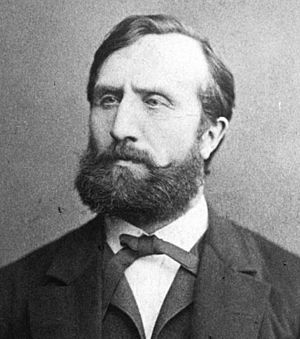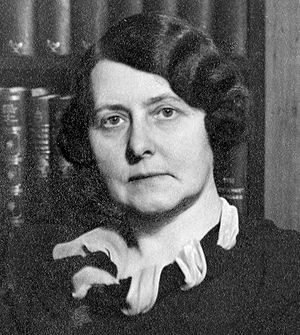Norwegian Association for Women's Rights facts for kids
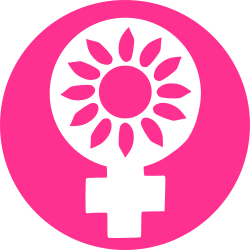 |
|
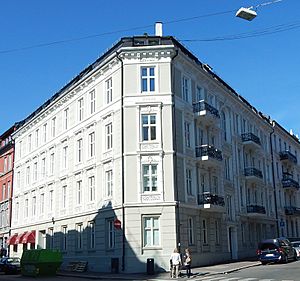
NKF's offices in Majorstuen, Oslo
|
|
| Founded | 28 June 1884 |
|---|---|
| Founders | Gina Krog and Hagbart Berner |
| Focus | Gender equality |
| Headquarters | Majorstuen, Oslo |
| Methods | Law reform, political advocacy |
|
President
|
Anne Hege Grung |
| Affiliations | International Alliance of Women |
The Norwegian Association for Women's Rights (in Norwegian: Norsk Kvinnesaksforening, or NKF) is Norway's oldest and most important group working for the rights of women and girls. Its main goal is to create gender equality, which means making sure everyone has the same rights and opportunities, no matter their gender. The group works to change laws and government policies to protect the human rights of all women and girls.
Founded in 1884, the NKF is a very old and respected organization in Norway. It was started by a group of 171 influential people, including five of Norway's prime ministers. The NKF believes in a type of feminism called liberal feminism, which focuses on achieving equality through new laws and political action. The group has always been open to everyone, including both men and women.
The NKF has played a huge part in all the major gender equality laws in Norway since it was created. It successfully campaigned for women's right to get an education, the right to vote, and the right to work. It also helped create the Gender Equality Act of 1978. Thanks to the work of the NKF and similar groups, Norway was the first independent country in the world to give women the right to vote in 1913.
Contents
How It All Started
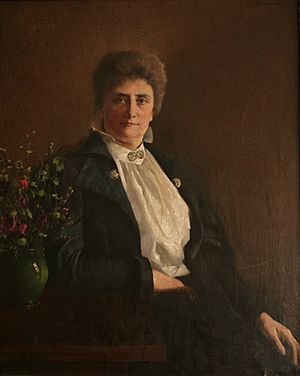
The Norwegian Association for Women's Rights was founded in 1884. Its main leaders were the women's rights activist Gina Krog and the politician Hagbart Berner. The founders were a mix of 87 men and 84 women, many of whom were famous and respected public figures.
From the beginning, the group was closely connected to Norway's Liberal Party. Many of its founders were prime ministers, members of parliament, and editors of major newspapers. The NKF's main focus has always been on changing laws to give women the same rights as men. This included rights like freedom of speech, the right to vote, and the right to own property. They also fought for women to have access to education and jobs.
The NKF has always been a mainstream organization that works with the government. It has attracted many lawyers and other educated professionals who help with its work. Because of its focus on legal changes, the NKF has had a big influence on Norway's government and laws about gender equality.
What NKF Believes In
The NKF is a non-partisan group, meaning it is not tied to any single political party. Its members come from many different parties, from the center-left to the center-right. The group's main goal is to achieve full equality for all women and girls. It uses a human rights approach, believing that women's rights are human rights.
The NKF works to get rid of laws, rules, and attitudes that are unfair to women and girls. It wants to create a society where everyone is treated equally. The group sees itself as a leader in the fight for equality in Norway, working to convince the government and parliament to make important reforms.
Key Goals of the NKF
The NKF focuses on several core issues to help women and girls.
A Fair Say in Politics and Laws
This has always been the NKF's most important goal. The group works to make sure women have equal political rights and are represented in government. It fights for legal equality, so that laws treat everyone fairly.
Equal Chances at School and Work
The NKF believes everyone should have the same opportunities in education and employment. It campaigns for equal access to schools and jobs, and for economic justice, which means fair pay and financial independence for women.
Working with Other Countries
The NKF is very involved in international work, especially with the United Nations (UN). The group is a member of the International Alliance of Women (IAW), which works with the UN and other global organizations. Through the IAW, the NKF cooperates with similar women's rights groups in other countries, like Iceland, Denmark, and Sweden.
Health and Family Choices
The NKF supports the right for women to make their own decisions about their health and family. This includes access to safe healthcare and health education. The group helped start another organization that promotes these rights both in Norway and around the world.
Supporting All Women and Girls
The NKF works for the rights of all people who identify as women and girls. The group supports LGBT+ rights as part of its work for human rights. It opposes any form of discrimination based on who someone is or whom they love. The NKF believes that to achieve true equality, the women's rights movement must include and support everyone, including lesbian and trans women.
Presidents of the NKF
The president is the leader of the NKF. The organization has had many important leaders over the years, including lawyers, politicians, professors, and even a Supreme Court Justice.
| No | Image | Name | Tenure | Background |
|---|---|---|---|---|
| 1 |
|
Hagbart Berner | 1884–1885 | Lawyer and Member of Parliament |
| 2 |
|
Anna Stang | 1885–1886 | Teacher, wife of a Prime Minister |
| 3 |
|
Ragna Nielsen | 1886–1888 | Teacher and politician |
| 4 |
|
Anna Bugge | 1888–1889 | Lawyer and diplomat |
| 5 |
|
Ragna Nielsen | 1889–1895 | Teacher and politician |
| 6 |  |
Randi Blehr | 1895–1899 | Humanitarian leader, wife of a Prime Minister |
| 7 |
|
Fredrikke Marie Qvam | 1899–1903 | Humanitarian leader, wife of a Prime Minister |
| 8 |  |
Randi Blehr | 1903–1922 | Humanitarian leader, wife of a Prime Minister |
| 9 | Aadel Lampe | 1922–1926 | Teacher and politician | |
| 10 |
|
Fredrikke Mørck | 1926–1930 | Teacher and editor |
| 11 |
|
Anna Hvoslef | 1930–1935 | Journalist |
| 12 |
|
Kitty Bugge | 1935–1936 | Union leader |
| 13 |  |
Margarete Bonnevie | 1936–1946 | Writer and politician |
| 14 |
|
Dakky Kiær | 1946–1952 | Headmistress and politician |
| 15 |  |
Ingerid Gjøstein Resi | 1952–1955 | Linguist and politician |
| 16 |
|
Marit Aarum | 1955–1956 | Economist and politician |
| 17 |
|
Signe Swensson | 1956 | Physician and Member of Parliament |
| 18 |  |
Eva Kolstad | 1956–1968 | Cabinet minister and party leader |
| 19 | Clara Ottesen | 1968–1972 | Economist and UN expert | |
| 20 |
|
Kari Skjønsberg | 1972–1978 | Professor and politician |
| 21 |
|
Karin M. Bruzelius | 1978–1984 | Supreme Court Justice |
| 22 | Sigrun Hoel | 1984–1988 | Lawyer | |
| 23 | Irene Bauer | 1988–1990 | Politician and civil servant | |
| 24 | Siri Hangeland | 1990–1992 | Lecturer | |
| 25 | Bjørg Krane Bostad | 1992–1994 | Civil servant | |
| 26 |
|
Kjellaug Pettersen | 1994–1998 | Civil servant |
| 27 | Siri Hangeland | 1998–2004 | Lecturer | |
| 28 |
|
Berit Kvæven | 2004–2006 | Engineer and politician |
| 29 |
|
Torild Skard | 2006–2013 | Researcher, former Chairman of UNICEF |
| 30 |
|
Margunn Bjørnholt | 2013–2016 | Professor of Sociology |
| 31 |
|
Marit Nybakk | 2016–2018 | First Vice President of the Norwegian Parliament |
| 32 |
|
Karin M. Bruzelius | 2018–2020 | Supreme Court Justice |
| 33 | Anne Hege Grung | 2020– | Professor of Theology |
Symbols and Awards
The logo of the NKF is a sunflower. It was chosen in 1894 and was inspired by the American movement for women's right to vote. The sunflower became an international symbol for the cause. For the NKF, the sunflower represents its long history of working for gender equality through political change.
The NKF gives out two main awards. Its highest award is an honorary membership, given to people who have made great contributions to the cause. Since 2009, the group also gives out the Gina Krog Prize, named after its founder, to honor people who have worked for women's rights.
See also
 In Spanish: Asociación Noruega por los Derechos de las Mujeres para niños
In Spanish: Asociación Noruega por los Derechos de las Mujeres para niños
 | Sharif Bey |
 | Hale Woodruff |
 | Richmond Barthé |
 | Purvis Young |


